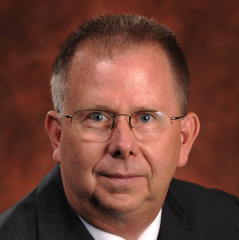The Republican-led Congress, with the backing of President Donald Trump, has been promising sweeping tax reform legislation before the end of the year. The president’s proposal includes cutting the corporate tax rate from 35 percent to 20 percent and shrinking the number of personal tax brackets from seven to three. Trump’s ambitious promise: “the largest tax cut in the history of our country.”
To assess the potential impact of a major overhaul of the tax code, ASU Now reached out to Dennis Hoffman, professor of economics and director of the L. William Seidman Research Institute at Arizona State University's W. P. Carey School of Business. Among his warnings is the risk of lost revenue: “Rarely do tax cuts ‘pay for themselves’ even if they do stimulate the economy,” he said.

Dennis Hoffman
Question: The last time there was tax reform it was in 1986, and it passed with strong bipartisan support. Why do you think this issue is emerging once again after 31 years?
Answer: Reform of the corporate tax code has been discussed for several years with no action from Congress. President Trump ran on a platform of tax reform/reduction seeking to reverse the modest increases we saw in 2012 and deliver tax cuts.
Q: Is tax reform necessary, and why? What needs to be fixed?
A: The tax code is indeed quite complex and the corporate rate among the highest in the developed countries. So some form of reform makes sense. However, the economy is actually quite strong and the labor market is very tight. So from an efficiency perspective reform makes sense, but the economy is not really in need of a stimulus.
Q: How could tax reform positively affect the United States?
A: If tax reform helps stimulate business investment that boosts productivity, it could indeed accelerate the pace of GDP growth. It is unclear how much of this acceleration will affect workers in a positive way. Indeed, some new investments may be “labor saving,” e.g. more robotic production that displaces labor. This is the price of innovation. In the long run the economy will adapt and more job opportunities will occur, but it could be disruptive in the short run. Further, there are large numbers of people employed today in businesses that exist to help corporations cope with a cumbersome tax code. Tax reform may render these positions obsolete.
Q: Is there a risk that tax cuts may leave the federal government short of revenue to run the government?
A: This risk is very real. Rarely do tax cuts “pay for themselves” even if they do stimulate the economy. The stimulus comes with lower tax rates and likely lower tax revenue. There are countless examples with the most recent one being the reduction in corporate taxes in Arizona. There is no evidence whatsoever that the tax rate reductions in the state have generated any additional economic stimulus that has helped recoup lost revenue.
Q: The issue of income inequality has become an increasingly critical challenge for American society. Do you think tax reform is likely to exacerbate or fix the problem?
A: Income inequality has its roots in vastly different skill levels. It makes more sense to address it through providing incentives and opportunities for people to invest in skills that can help them succeed in the marketplace. Trying to fix or avoid inequality through the tax code is really quite distortionary. Some will argue that high-income people need to pay more and/or that the tax cuts should go to middle- and lower-income people. The reality is that high-income people do pay significant amounts of tax so most types of tax reform or tax rate reduction will likely deliver significant tax cuts to them.
Top photo courtesy of Pixabay
More Law, journalism and politics

Arizona secretary of state encourages students to vote
Arizona Secretary of State Adrian Fontes looked right and left, taking in the more than 100 students who gathered to hear him speak in room 103 of Wilson Hall.He then told the students in the Intro…

Peace advocate Bernice A. King to speak at ASU in October
Bernice A. King is committed to creating a more peaceful, just and humane world through nonviolent social change.“We cannot afford as normal the presence of injustice, inhumanity and violence,…

CNN’s Wolf Blitzer to receive 41st Walter Cronkite Award for Excellence in Journalism
Wolf Blitzer, the longtime CNN journalist and anchor of “The Situation Room With Wolf Blitzer,” will accept the 41st Walter Cronkite Award for Excellence in Journalism, Arizona State University has…
